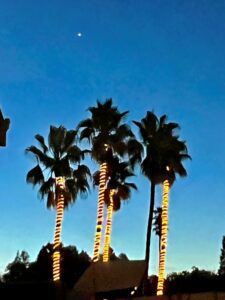Congratulations! We have nearly completed a 365-day crash course about life on Earth. Hard-won knowledge, my friends. Hard-won knowledge.
A friend once told me: “Who cares about a knight in shining armor? If the armor is still shining, that’s just a guy who hasn’t fought for anything yet.” So if you’re feeling a little beat-up this year-end, good job. We’re all fighting a lot of wars on a lot of fronts.
Fact is, our values cost us something. They’re the thing we say “yes” to, the things we’re willing to sacrifice for. A potential client was interviewing me, and they asked what kind of work or tasks I turn down. What a terrific question! In that context, it was about professional capacity, but it also made me think about what I say “yes” and “no” to, and how that’s an expression of values.
And what brings light to a dark world, if not the things we value?
This is a personal, and therefore fluid list, but here’s a Sunshine Communications screenshot for Solstice 2023.
Building. I value building and growth in all its forms—that combination of creativity, determination, vision and grit that makes something out of nothing. Such a thrill, and a battle, but as philosopher Ted Lasso said: “Don’t fight back, fight forward.” Some fights need fightin’, but it should always be to make things better. Retribution alone is just not worth it. When we’re building productively, we naturally orient toward strategies that keep our tactics on the high road, and that matters too.
I love small business building most of all. I went to Urban Craft Uprising this winter and it was amazing to see all the independent makers of the region, and it just keeps getting better. Independent restaurants are the lifeblood of Seattle neighborhoods; every musician and artist is building, too. I want to see our elected officials also express a value for the entrepreneurs among us, and make it easier to hire and grow.
Fit. Certainly between consultant and clients, a good fit creates natural synergy, trust, speed and success. Fit also matters

for internal teams, with the caveat that we have to fight the temptation to find “someone who fits” by finding “someone who is already like Us.” That’s obviously how we end up with organizations with a lack of diversity, or teams who all think the same. Monotone thinking is bad for business.
I like how puzzle pieces fit: all different shapes, incomplete on their own, interdependent parts of a complex picture. In other words, “fit” can also mean “totally different from what we have now and the thing we are missing.”
Adulthood is chock full of paradoxes, is it not?
The media. Reporters are not the enemy; bad reporting is the enemy[i]. We need more journalists to get paid more to do deeper reporting and better writing—not fewer. Is there a crisis in quality and trust in media? Yes. Are trust and quality related? Yes. Do we have ourselves as consumers to blame? Probably. It’s complex.
I believe that local media outlets love Seattle as much as I do. So knowing that we share a love of Seattle and an informed public, how can we address this issue in a way that benefits residents? How, and what, do we build?
Also, it’s a presidential election year. More reporters, please. Go deep, fact check each other, listen, learn, tell. Be brave. We need you.
Curiosity. Leading with curiosity is a bit of a cliché, I know, but here’s the thing: curiosity can be exhausting and we need to be reminded to do it, or we won’t.
Curiosity is not just a state of mind or an innate characteristic. It’s an active decision to 1) keep one’s mind open and 2) to engage in active information-seeking and critical thinking. And the older and smarter we get, the easier it is to rely on what we already know.
Here’s a personal, non-work example of a curiosity fail: My back hurt. This happens, right? And you try all the things- stretch, rest, ice, heat, massage, bourbon, etc. I was busy, I didn’t want to see myself as self-pitying or old, so I ignored it. It got worse, until I finally went to a doctor. Tylenol and 8 weeks of PT, and I’m fine. I also feel pretty dumb: Instead of trying to cure myself with a big glass of denial and a chaser of positive thinking, I should have been simply curious about the pain and gone to a doctor. It would have saved me 6 achy months. Doh!
Here’s the professional context: Another reason why I reject the media-as-enemy approach is that most media crises are not media crises—they’re internal problems that a reporter brought to light. Even with bad reporting, there’s something to be understood about the root causes of a situation that ends up being a headline.
I value the opportunity to support other people’s curiosity. In November, a graduate Public Health class at UC Berkeley asked me to speak about healthcare policy. I decided it would be easier to explain how I think about the entire healthcare system. That took about 10 minutes as I am no expert at all, but then we got to spend a ton of time in discussion, and that was great. Q&A is a better way to learn than a lecture anyway.
The Association of Washington Public Hospital Districts also gave me the opportunity to host a panel about public engagement, which I loved. The best part about moderating is that you get to have deep conversations with the expert panelists, and it was inspiring to hear how three different PHDs were working to build relationships with their communities.
Learning is hard. With my amazing partners at LundFaucett, we did some media trainings for subject matter experts at the City of Seattle. Getting ready to talk to reporters is not easy, but these experts worked hard to learn a new skill. It’s also hard to feel like an amateur, which we all have to do sometimes. So no matter what you do, or ask your teams to do, take a beat to celebrate progress.
Sunlight as disinfectant. I consider “communication consultant” to be shorthand for “business consultant with expertise in the flow of information.” I’m passionate about good management and strong organizational culture, and it’s always a thrill and an honor to be allowed to do both.
The times I’ve been invited to “Come in, pick up the rocks, see what’s under there, and recommend an approach that will help improve both our operations and reputation” have been the absolute best times of all. Bringing problems to light is uncomfortable, but ensures organizational longevity.
Good people. If you are a client or a partner, THANK YOU. I am proud of the people I work for and with, and so grateful for the time we spend together.
- Vanessa at LundFaucett is perpetually my partner in constructive curiosity;
- Tina Nole at Larj Media helps me understand the podcast industry and the creative use of AI;
- Marty Reimer and Erin Gervais bring videos with warmth and insight for both the Chronic Disease Coalition (all credit: Hubbell Communications) and AWPHD;
- Matt Love and Maia Bellon at Cascadia are constantly illuminating the world of natural resources, Tribal relations, law and government for me. So grateful for the education!
I’m also really grateful for all the good people working at the City of Seattle, King County, and in all healthcare settings. They are all value-driven people, trying to make life better for communities and patients, and they are not easy jobs. It’s one of my central goals to support the internal teams, and I’m truly grateful for their partnership.
Music. I still love movies so much, but nothing beats being in a crowded room with a live band. (Especially if the room is the Showbox and the band is Super Diamond. Or SMASH or SMooCH– Seattle has the best benefit concerts!)
There’s truth and fierceness in music and in books and movies about music, and really, it’s all about life[ii]:
Life, Keith Richards autobiography: The Stones aren’t my first favorite band, but the book is fascinating. I first read it about 10 years ago and a few things are stuck in my head, including how Keith said that Boy Scouts was where he first learned to “run a bunch of guys.” The ramifications of that are epic.
Muscle Shoals: My uncle JD turned me on to this amazing slice of American history that also hit for me the importance of fit and curiosity and putting music above all: Think of it: New York and English musicians going down to Alabama to join Black and white musicians playing together… the stories go on and on.
Wrecking Crew: Loved this documentary too, about Tommy Tedesco and his fellow studio musicians who played on thousands of studio and television recordings. My favorite take was Tedesco talking about the warehouse job he had in upstate New York, before he moved to LA: “It was the best job I ever had. It was so awful that I practiced guitar every day.”
That’s how we find sunshine in the middle of winter, I guess. Good people, sharing a curious and constructive mind-set, focusing on truth, and really loud music.
I hope you took some good from the lessons of 2023. I hope you solved some problems, set some goals, made progress, helped others, learned from others, and celebrated all of it. And if you’re in a darkish season right now, that’s all right. Find a meditation guide who speaks your language, focus on your breathing, and know that the work you do today will pay off tomorrow.
And now, to rest.
With all the love,
Mary Kay
 Re: The 2023 Sunshine Communication playlist. Well. A little more jacked up than normal, to be honest. Some years you need a little more octane!
Re: The 2023 Sunshine Communication playlist. Well. A little more jacked up than normal, to be honest. Some years you need a little more octane!
[i] Not bad stories. Those happen. But uninformed, lazy reporting? Wretched. Reporters who rely more on editorial comment and adverbs instead of true analysis of complex situations? It’s part of why we’re here.
[ii] Music will save us—look what it did for Bill and Ted! Got them high school diplomas so they could stay friends and save the world (Bill & Ted Face The Music is actually hella charming. Highly recommend!).


